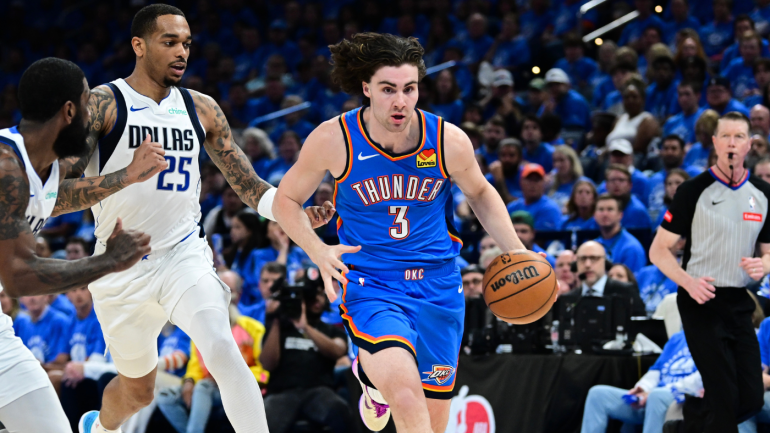Breaking: The Oklahoma City Thunder have terminated the contract of their best shooting guard, as per ESPN
How Josh Giddey’s playoff limitations raise immediate and long-term questions about Thunder’s plans

Are the Thunder willing to deviate from their typical approach?
A little bit more than a year ago, the Oklahoma City Thunder were fighting just to reach the Play-In Tournament. Reaching the postseason would have been a meaningful signal of progress for a team that had spent the previous two seasons in the lottery, but Oklahoma City remained conservative in how it dealt with a minor Shai Gilgeous-Alexander ankle injury. He largely managed to play through the pain, but a critical loss against the Charlotte Hornets came with their star on the sideline. In addition, Oklahoma City used 12 different players in that late-season loss, a rarity even in a standard regular-season game let alone what might have been considered a must-win.
Though coach Mark Daigneault did not directly address the injury or his rotations for the Hornets game, he was asked if he was prioritizing a postseason appearance in the way he approached the end of the season. In short, he was not.
“I think if it is an outcome that is downstream of our process and the way that we’re trying to do things it would be great because it would just be kind of a marker along the way, but it’s not so important that it’s gonna distract us from our way of doing things,” Daigneault said of the potentially reaching the 2023 postseason. “We need to bet on that, day over day over day, we’ve done that for two or three years. That’s what’s put us in a position to compete for the play-in, so for us to abandon that at this point would be hasty, and quite frankly, we need to double-down on this mentality past this season. That’s why we’re doing what we’re doing.”
The Thunder ultimately did reach the 2023 Play-In Tournament. One year later they became the youngest No. 1 seed in NBA history, and they did so while maintaining that same principle of emphasizing process over results. No member of their team averaged more than 34 minutes, but 13 players averaged at least 10 minutes per game when they appeared, and despite being one of the NBA’s healthiest teams, they used a total of 20 players in 10 or more games this season. When the entire basketball world told them to trade for a bigger, traditional backup center, they not only declined to do so at the deadline, but actively facilitated such an acquisition for a Western Conference rival, the Dallas Mavericks, when they sent out a first-round pick in a deal that landed the Mavericks Daniel Gafford.
Even as they reached the postseason, they didn’t budge. They’ve run a 10-man rotation throughout the playoffs. They used 11 in their playoff-opening win over the New Orleans Pelicans. At a point in the season in which Tom Thibodeau routinely refuses to give Josh Hart even a single rest, Gilgeous-Alexander is the only member of the Thunder to play even 40 minutes in a single game during Oklahoma City’s current second-round series against the Mavericks. The Thunder have fairly explicitly spelled out what kind of team they want to be, and at the risk of oversimplifying, their vision is an egalitarian one. They want to spread minutes out and develop as many young players as possible. They want multiple ball-handlers on the floor so no single player is monopolizing their offense. They tend to shun specialists, like brawny big men, so they can emphasize team-wide spacing and athleticism. Those ideals got them this far. The Thunder were elite in nearly every statistical category this season except rebounding.
The idea of remaining true to your core principles is noble. In the playoffs, you adapt or you die. Nowhere has that been more true for the Thunder than in the role held by one of their core players: Josh Giddey.
The No. 6 pick in the 2021 NBA Draft checks a lot of those boxes the Thunder have relied on in the regular season. He’s essential to Oklahoma City’s stellar transition offense, and his passing and ball-handling takes a ton of pressure off of Gilgeous-Alexander. He’s the second-leading rebounder on a team that doesn’t rebound. He’s far from an elite defender, but he’s big enough and smart enough to function in a system filled with better ones. These are all positive traits. Giddey is a good player. But he has become by far Oklahoma City’s biggest vulnerability against Dallas in a series the Mavericks suddenly control.
Giddey, who has started every game he’s played in a Thunder uniform, has played 41 total minutes in three games this series. The Thunder have lost those minutes by 28 points. No other player on the roster has a point-differential worse than minus-8. The Thunder have played 103 minutes in this series without Giddey and they’ve won those minutes by 37 points. They’re still losing the series because the Giddey minutes have been so damaging.
We are again oversimplifying here, but the obvious explanation here is that all of those traits that make Giddey so important to who the Thunder want to be from October through April just aren’t nearly as valuable in May. Right now, Giddey just isn’t doing anything to help his team.
In fact, his mere presence has started to prove somewhat harmful. The Mavericks aren’t guarding him.



